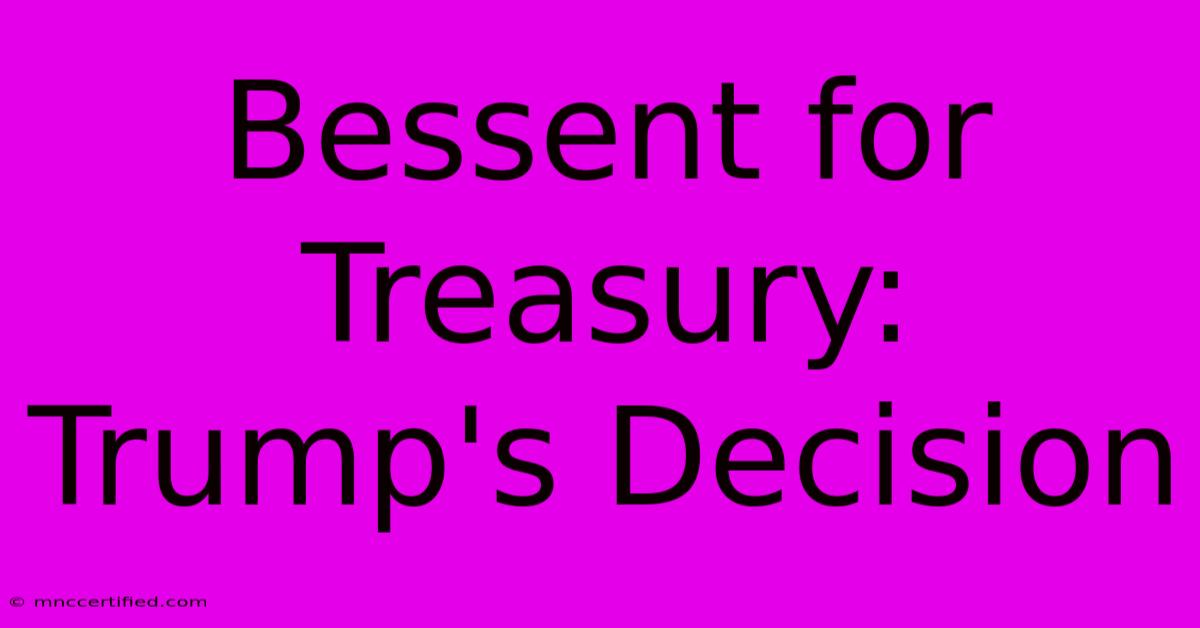Bessent For Treasury: Trump's Decision

Table of Contents
Bessent for Treasury: Examining Trump's Controversial Nomination
Donald Trump's presidency was marked by numerous controversial appointments, and the nomination of Steven Mnuchin as Treasury Secretary was no exception. While Mnuchin ultimately served in the role, the selection process itself, particularly the consideration of other candidates, generated considerable debate. This article delves into the potential nomination of individuals like Steven Mnuchin and explores the factors that likely influenced Trump's final decision. We'll analyze the context surrounding the choice, highlighting the political implications and the potential consequences of different selections.
Understanding the Context: The Need for a Treasury Secretary
The role of the Treasury Secretary is crucial. This individual is responsible for managing the nation's finances, advising the President on economic policy, and representing the United States in international financial institutions. Therefore, the selection process is inherently political, influenced by the President's economic philosophy and the need to secure Senate confirmation.
The search for a suitable candidate during the Trump transition was particularly intense. The incoming administration faced significant economic challenges, including a large national debt and concerns about global economic stability. The ideal candidate would possess a deep understanding of financial markets, a proven track record in finance, and the ability to navigate the complexities of Washington, D.C.
Alternative Candidates and Their Strengths and Weaknesses (Hypothetical Scenarios)
While Mnuchin ultimately won the nomination, several other individuals were reportedly considered. While definitive lists of candidates are hard to come by, speculation during the transition often focused on individuals with strong financial backgrounds. Let's explore some hypothetical alternative candidates and how their nominations might have altered the narrative:
Hypothetical Candidate A: A Focus on Fiscal Conservatism
A candidate with a strong background in fiscal conservatism might have prioritized deficit reduction and balanced budgets. This approach could have appealed to a segment of the Republican base, but potentially clashed with Trump's own spending plans. The potential challenges of Senate confirmation would depend heavily on the candidate's specific policy positions and political connections. The media would likely have focused heavily on the candidate's plans for cutting government spending and their potential impact on social programs.
Hypothetical Candidate B: A Wall Street Insider with a Different Perspective
A different Wall Street figure, perhaps someone with a more international focus, could have presented a contrasting approach. This individual might have emphasized international trade and global economic cooperation, potentially leading to a less protectionist stance than Mnuchin ultimately adopted. The media scrutiny would likely have been intense, examining the candidate’s past dealings and potential conflicts of interest.
Mnuchin's Nomination: The Winning Strategy
Ultimately, Trump selected Steven Mnuchin. Mnuchin's background as a former Goldman Sachs executive and Hollywood financier provided a unique blend of Wall Street experience and business acumen. This likely appealed to Trump's desire for a candidate with significant experience in the private sector. His relatively smooth Senate confirmation process suggests that he effectively navigated the political landscape.
Analyzing the Impact of the Choice
Mnuchin's tenure as Treasury Secretary was marked by significant tax cuts, deregulation efforts, and involvement in international economic negotiations. These policies, and their impact, became major focal points of political debate during his term. The selection of a different candidate would inevitably have resulted in different policy outcomes, shifting the economic and political trajectory of the Trump administration.
Conclusion: The Importance of Presidential Appointments
The selection of a Treasury Secretary, or any high-level cabinet position, is a critical decision with far-reaching consequences. Trump's choice of Mnuchin, and the hypothetical alternatives, illustrate the complex interplay of political considerations, economic philosophy, and the personalities involved in shaping the direction of the US government. Understanding this process is crucial to grasping the complexities of American politics and the enduring impact of presidential decisions. Future analysis should continue to explore the long-term consequences of these appointments and the broader influence they have on policy.

Thank you for visiting our website wich cover about Bessent For Treasury: Trump's Decision. We hope the information provided has been useful to you. Feel free to contact us if you have any questions or need further assistance. See you next time and dont miss to bookmark.
Featured Posts
-
Seedorfs Ucl Debut Matchday Food And Drink
Nov 26, 2024
-
Judge Rules Against Trump On 2020 Election
Nov 26, 2024
-
Lana Del Rey Announces Stadium Tour
Nov 26, 2024
-
Taylor Park Trading Post Cabins
Nov 26, 2024
-
Summer James Bond Casual Style
Nov 26, 2024